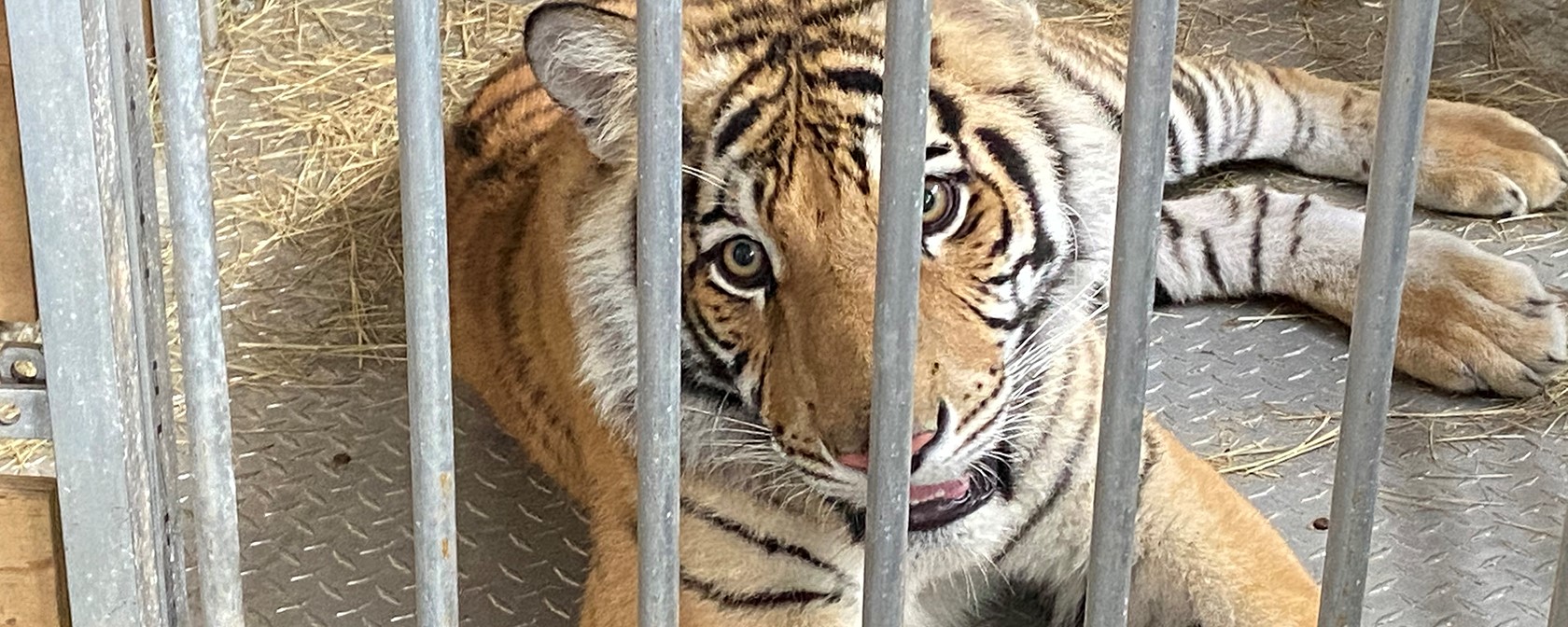By Sara Amundson and Kitty Block
If you’ve been online at all in the past week, chances are you’ve seen the footage of an alarmed off-duty police officer pointing a gun at an approaching tiger in a sleepy residential neighborhood in Houston.
The tiger’s name is India and, after a mysterious disappearance and a week of dramatic plot twists, he is now safe and settling in at his comfortable new home—the HSUS’s Black Beauty Ranch, a sprawling sanctuary in Texas.
Thankfully, no humans or animals were hurt in this incident, and this police officer fortunately exercised restraint and did not shoot the tiger. But the outcome could have been tragic for both the tiger and Houstonians. Just ask one of the many people who have been maimed after a run-in with someone’s “pet” lion or tiger; or ask one of the unfortunate people who has lost a loved one to a fatal mauling. Whenever you scratch the surface of the tiger pet trade, you’ll find tremendous animal suffering.
All across the U.S., tigers, lions and other big cats languish in basements, garages and tiny outdoor cages, straddling the boundary between wild animal and family pet, their freedom squelched and their biological needs unmet. In unaccredited breeding facilities, poorly run roadside zoos, traveling zoos, pseudo-sanctuaries and private menageries, in conditions ranging from barely adequate to squalid, tigers produce babies for private sale, cub petting operations and other businesses that exploit them. Deluded buyers treat baby tigers like domestic cats, but once those tigers hit maturity, they become extremely dangerous — in short order, the cute, cuddly oversized kitten becomes a massive, unpredictable predator. And that’s when the fates of tigers like India typically take a dramatic turn for the worse. When their natural predatory instincts kick in, they lose their status as beloved family “pet” and are suddenly locked up and often kept in isolation in dramatically inadequate enclosures where they cannot exercise any natural behaviors.
Fortunately, this will not be India’s fate. Houston authorities did a remarkable job in locating him and ensuring his safety, as well as that of the public. On Saturday, he was given over to authorities by the wife of the man seen whisking the tiger away from the police officer last week. India then spent a night at BARC Animal Shelter in Houston, and yesterday the Black Beauty Ranch team transported him to the sanctuary in Murchison, Texas.
There, India will enjoy a proper diet, enrichment and an expansive naturally wooded habitat where he can safely roam. The team at Black Beauty Ranch has gone to great lengths to create an environment that is as close as possible to what these animals would have in the wild.
This is not the first time in Texas that Black Beauty Ranch has taken in a tiger who was a victim of the exotic pet trade. In February 2019, it took in a tiger named Loki, who had been left caged in an abandoned house. Just three months ago, the sanctuary took in Elsa, who was discovered outside during Houston’s deadly snow storm and who, like India, is approximately 9 months old.
It’s important to us that these three tigers get to live in our safe, caring place. But these are just the lucky animals out of so many unfortunate ones. Thousands of other tigers continue to suffer in dismal conditions. That’s why we at HSLF and our colleagues at the HSUS are working so hard to support the critical efforts led by key members of Congress to pass the Big Cat Public Safety Act. We’re also pushing hard to secure legislation in Texas, New York and other states whose laws on the keeping of private exotics are too lax, leading directly to the kind of situation that put India and Houston residents at serious risk.
The federal bill would stop the terrible cycle of abuse caused by people who buy tigers from unscrupulous breeders but who can’t come close to meeting the needs of these complex and powerful animals. For the sake of the thousands of tigers like India, Elsa and Loki who have not yet been rescued and who languish in squalor, I hope you’ll contact your representatives in Congress and urge them to support this bill.
Kitty Block is President and CEO of the Humane Society of the United States.




